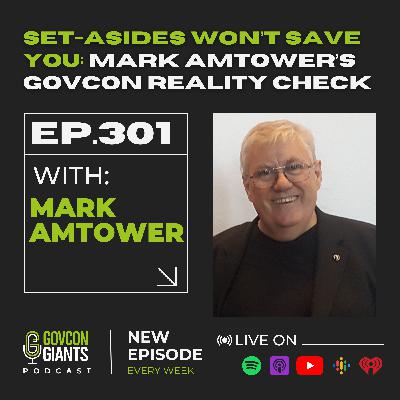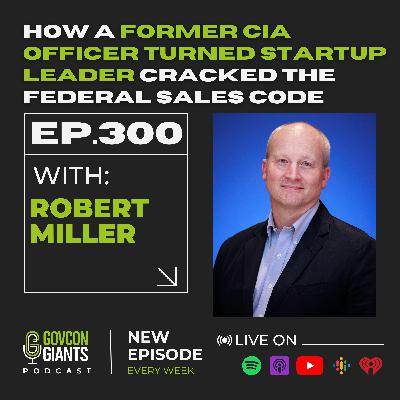Discover Govcon Giants
Govcon Giants

Govcon Giants
Author: Eric Coffie
Subscribed: 87Played: 4,290Subscribe
Share
Description
Hosted by government contracting expert, 8(a) business mentor, and founder of the Govcon Giants platform, Eric Coffie. With over 250K+ podcast listens, a thriving YouTube channel of 49K+ subscribers, and a LinkedIn community of 19k+ followers, Eric has built one of the most trusted voices in federal contracting. Govcon Giants isn't just another podcast—it ranks on the U.S. procurement leaderboard and is recognized as the #5 overall creator worldwide in procurement, cementing Eric's role as a true authority in this space.
On this podcast, you'll discover how to win more contracts, scale your small business into a sustainable government contracting powerhouse, and learn the insider strategies that have helped countless entrepreneurs break into the $700B+ federal marketplace. Through real conversations with industry leaders, agency insiders, and successful business owners, Eric brings you the playbook for success—covering everything from 8(a) certification and set-asides to subcontracting, teaming, and beyond.
Whether you're just starting out or looking to scale, Govcon Giants is your roadmap to navigating one of the most profitable yet misunderstood markets in the world—government contracting.
On this podcast, you'll discover how to win more contracts, scale your small business into a sustainable government contracting powerhouse, and learn the insider strategies that have helped countless entrepreneurs break into the $700B+ federal marketplace. Through real conversations with industry leaders, agency insiders, and successful business owners, Eric brings you the playbook for success—covering everything from 8(a) certification and set-asides to subcontracting, teaming, and beyond.
Whether you're just starting out or looking to scale, Govcon Giants is your roadmap to navigating one of the most profitable yet misunderstood markets in the world—government contracting.
599 Episodes
Reverse
In this episode of The Eric Coffie Show, Eric challenges listeners to stop waiting for the shutdown to end and start preparing now—because when the government reopens, only the ready will win. He breaks down why agencies like DoD, CIA, FBI, and DHS are still fully funded and still awarding contracts, and shares real examples of entrepreneurs who are writing proposals, hiring staff, and securing wins during the shutdown. Eric and Randy also address community needs—including the launch of a women's group—and emphasize the importance of staying engaged, sharing ideas, and building the confidence to step into rooms with major agencies and primes. This episode is a push to stop hesitating, start preparing, and recognize that underdogs belong at the table just as much as anyone else. Key Takeaways Shutdowns don't stop DoD, intel agencies, or funded departments—opportunities are still active. Winners prepare during downtime: proposals, readiness, relationships, and strategy. Community matters—sharing ideas, building confidence, and creating spaces (like a women's group) accelerates growth. Learn more: https://federalhelpcenter.com/ https://govcongiants.org/ Watch the full Youtube Live here: https://www.youtube.com/live/xEQKIP4wIrE?si=x9oU8ENE4Y74H98T
In this episode of The Eric Coffie Show, Eric reveals why so many small businesses struggle in GovCon—not because opportunities are scarce, but because most aren't procurement-ready when it counts. He highlights how high-level relationships with major primes like SAIC, Encore Funding, Collins Aerospace, and federal agencies open doors to subcontracting opportunities even during market slowdowns, and he shares the powerful story of winning a $5M subcontract with bad credit, debt, and zero bonding by leveraging partnerships and vendor credit. Eric also breaks down the revamped Federal Help Center, now built to help beginners get foundational tools in the Starter Group while serious contractors get advanced deal-making strategy inside the Pro Hub, backed by lenders, CDFIs, and industry insiders committed to helping small businesses win. Key Takeaways Most businesses lose in GovCon because they're not procurement-ready when opportunity arrives. You can win major contracts as a subcontractor—even without capital, bonding, or great credit. The right community and prime relationships unlock opportunities no bid website ever will. Learn more: https://federalhelpcenter.com/ https://govcongiants.org/ Watch the full Youtube Live here: https://www.youtube.com/live/xEQKIP4wIrE?si=x9oU8ENE4Y74H98T
In this episode of The Eric Coffie Show, Eric reconnects with Randy Ward, a longtime student-turned-partner who went from asking questions in 2017 to closing $22 million in PPE contracts during the 2020 shutdown. Together, they share the highs and lows of that experience — the excitement of massive wins, the painful lessons of unfilled orders, and the resilience that defines every true GovCon entrepreneur. With another government shutdown now matching the longest in history, Eric and Randy reveal a major pivot: their upcoming GovCon Mastermind has been transformed into a two-day virtual Boot Camp—"Surviving with Certifications." Set for November 15–16, the event will stream live for Federal Help Center Pro members, offering insider strategies to thrive when others freeze. Whether you're intimidated, uncertain, or just not "ready" yet, this session will show how shutdowns can become your biggest growth opportunity. Key Takeaways Learn how Randy turned shutdown chaos into $22M in contracts — and what went wrong. Why fear and inaction keep small businesses from GovCon success. How to join the Surviving with Certifications boot camp and turn uncertainty into opportunity. Learn more: https://federalhelpcenter.com/ https://govcongiants.org/ Watch the full Youtube Live here: https://www.youtube.com/live/xEQKIP4wIrE?si=x9oU8ENE4Y74H98T
In this episode Eric sits down with Chris Griesedieck Jr. (GovCon counsel, Venable LLP) to unpack today's FAR Part 19 overhaul: the Rule of Two survives but is discretionary at the task-order level, size re-representation at the task-order level is removed, and 8(a) changes aim to boost post-graduation success. They also break down the CMMC rollout—starting November 10, DoD solicitations will begin requiring Level 1/2 self-assessments, many Level 2 efforts will need third-party certification, and POA&Ms can enable conditional awards (up to 180 days to cure). Chris shares a practical playbook for REAs and terminations—why recoveries differ under FAR Part 12 (commercial) vs Part 49 (non-commercial), what pre/post-termination and settlement costs are compensable, and why lost profits are almost never in scope absent bad faith. They cover agencies trying to insert new clauses via mods/options (when to insist on consideration or equitable adjustments), upticks in M&A/novations and inter-company work (profit limits with affiliates), and the shifting bid-protest landscape (tougher GAO pleading standards; higher DoD task-order thresholds). Key Takeaways: FAR Part 19—what changed today: Rule of Two saved; discretionary at task-orders; size re-rep at task-order level removed; 8(a) tweaks aim at post-graduation success. CMMC timeline & stakes: Starting Nov 10, new DoD RFPs will call for Level 1/2 self-assessments; many Level 2 contracts will need 3rd-party certification; conditional awards require an approved POA&M within 180 days. Protect your margin under stress: Use the right REA path (Part 12 vs. Part 49), recover allowable pre-/post-termination costs, and demand consideration/equitable adjustments when agencies add clauses or condition options; track tighter GAO protest standards and higher DoD task-order thresholds. Learn more: https://federalhelpcenter.com/ https://govcongiants.org/ Chris' Linkedin: https://www.linkedin.com/in/chris-griesedieck-jr-4226b544 Website: https://www.venable.com/
In this powerful wrap-up episode, Eric Coffie holds nothing back. He reminds listeners that opportunity doesn't just knock—it shows up at your event and waits for you to walk through the door. From the Department of Defense's Acting Deputy Chief Digital AI Officer to Central Command and the National Science Foundation's Cyber Infrastructure Director, Eric reveals how he brought top-tier federal decision-makers directly to his community—and most people still didn't show up. He shares a transparent look into his own network-building approach, proving that access, generosity, and opportunity are everywhere for those willing to participate. Key Takeaways: Access is earned by showing up: The DoD AI Chief, Central Command, and NSF all attended Eric's event—and only a handful of people seized the chance. Generosity builds trust: The same partners who spoke at his event sponsored the bar tab—proof that strong relationships lead to goodwill and access. Visibility beats anonymity: If you're hiding behind "LinkedIn User," no one can find or help you—visibility builds credibility. Learn more: https://federalhelpcenter.com/ https://govcongiants.org/ Listen to the FULL Youtube Live here: https://youtube.com/live/CSj43yA6vcI All the video links discussed. https://docs.google.com/document/d/1zEcjpP-CcDTdVggNyY1qsJUGECZNGZeW9luftdAS39U/edit?usp=sharing
In this episode, Eric Coffie breaks down the real secret to getting access, opportunities, and contracts in the federal space — showing up. He shares exactly how he built relationships with $40M, $75M, and even $1.6B players simply by being intentional, proactive, and unafraid to ask. From pre-planning seven to eight networking lunches before even moving to D.C. to publicly posting "Invite me to everything" on LinkedIn, Eric reveals the mindset that puts you "in the room" where decisions are made. If you've ever wondered how to connect with top GovCon leaders like Frank Spencer (Aztec Contractors) or Anthony from Colossal, this is your roadmap. Key Takeaways: Relationships beat resumes: Getting in rooms with $1.6B firms like Colossal starts with one simple step — ask to be invited. Plan before you arrive: Eric lined up 7–8 meetings in advance before moving to D.C., proving preparation creates opportunity. Advocate for yourself: If you're too shy to talk about what you do, no one else will — confidence builds credibility. Learn more: https://federalhelpcenter.com/ https://govcongiants.org/ Listen to the FULL Youtube Live here: https://youtube.com/live/CSj43yA6vcI All the video links discussed. https://docs.google.com/document/d/1zEcjpP-CcDTdVggNyY1qsJUGECZNGZeW9luftdAS39U/edit?usp=sharing
In this episode, Eric Coffie lays out the tough truth about why so many small businesses stay stuck after getting certified. He calls out the excuses holding entrepreneurs back and shows what separates the winners from the watchers. From GSA schedules and sources sought to consulting partnerships and funded agency strategies, Eric gives a blueprint for creating your own success — even during uncertainty. He shares real examples, like a contractor who won eight out of ten recent projects as sole-source awards, and explains how consulting can generate income without any risk. This isn't about waiting for opportunities — it's about getting in the game, leveraging relationships, and taking ownership of your results. Key Takeaways: Stop waiting for contracts — create your own opportunities through sources sought and networking. Consulting can be your zero-risk gateway to re-enter the market and build deal flow. Agencies like the VA and GSA are still funding — the money hasn't stopped; only your action has. Join the Bootcamp: https://govcongiants.org/bootcamp Learn more: https://federalhelpcenter.com/ https://govcongiants.org/ Listen to the FULL Youtube Live here: https://youtube.com/live/CSj43yA6vcI All the video links discussed. https://docs.google.com/document/d/1zEcjpP-CcDTdVggNyY1qsJUGECZNGZeW9luftdAS39U/edit?usp=sharing
In this episode, Eric Coffie calls out the biggest myth in GovCon—that there aren't enough opportunities. He breaks down why lawyers, accountants, and even other small business owners already have the inside track on contracts, acquisitions, and partnerships—you're just not asking. From unused GSA schedules to overflow projects from busy contractors, Eric exposes how many deals are hiding in plain sight. The problem isn't access—it's action. If you're serious about teaming, scaling, and winning, this episode is your reminder to get out of your house, get in the room, and start talking to the people who already have what you want. Key Takeaways: Relationships with lawyers, accountants, and service providers = untapped deal flow. Many GSA schedule holders aren't using them—team up and put them to work. The biggest barrier isn't opportunity; it's your willingness to show up and ask. Join the Bootcamp: https://govcongiants.org/bootcamp Learn more: https://federalhelpcenter.com/ https://govcongiants.org/ Listen to the FULL Youtube Live here: https://youtube.com/live/CSj43yA6vcI All the video links discussed. https://docs.google.com/document/d/1zEcjpP-CcDTdVggNyY1qsJUGECZNGZeW9luftdAS39U/edit?usp=sharing
In today's episode, Eric sits down with Mark Amtower, one of the most respected voices in the government contracting (GovCon) space. With over 18 years hosting on Federal News Radio and 17 years writing for Washington Technology, Mark shares timeless insights from his decades-long career helping companies master government marketing, branding, and networking. From the days of mailed newsletters in the '80s to the LinkedIn era, Mark explains how visibility, credibility, and consistency still drive business in the federal market. He also dives deep into the state of small businesses in 2025, why consolidation and shutdowns pose new threats, and what GovCon entrepreneurs must do now to adapt, brand smarter, and thrive. Mark also offers tactical tips on LinkedIn strategy—from optimizing your profile headline and banner to building influence through content, engagement, and authentic relationships. He reveals how only 1% of LinkedIn users post weekly, and why that tiny number creates a massive opportunity for those willing to show up, share expertise, and stand out. Key Takeaways: LinkedIn remains the #1 platform for B2B and B2G visibility—with nearly 3 million feds active on the platform. Small businesses face their toughest market in years—success now requires brand credibility and proactive strategy, not just certifications. Engagement beats perfection: meaningful posts and personal follow-ups convert better than flashy marketing. Learn more: https://federalhelpcenter.com/ https://govcongiants.org/ Mark's Linkedin: www.linkedin.com/in/markamtower Website: https://markamtower.net/ Mark's Podcast: https://federalnewsnetwork.com/shows/amtower-off-center-podcast/ Resources mentioned: I'm on LinkedIn—Now What? by Jason Alba – Amazon listing: https://www.amazon.com/Im-Linkedin-Now-What-Fourth-Linkedin/dp/1600052541 Amazon The New Rules of Marketing & PR by David Meerman Scott – Publisher's page: https://www.davidmeermanscott.com/books/the-new-rules-of-marketing-and-pr
In this episode, Eric Coffie delivers a wake-up call to small business owners chasing government contracts but skipping the rooms that create them. He lays out proof: multimillion-dollar contractors, agency insiders, and program directors from NASA, DOD, SBA, and the Department of State have all shown up to help—yet most small businesses never do. Eric breaks down how relationships with lawyers, accountants, and service providers can open doors to major opportunities and why showing up is still the most underrated growth strategy in GovCon. Key Takeaways: Stop waiting for access—you're being invited and not showing up. Relationships with service providers = insider introductions. The real ROI is in the room, not in the replay. Join the Bootcamp: https://govcongiants.org/bootcamp Learn more: https://federalhelpcenter.com/ https://govcongiants.org/ Listen to the FULL Youtube Live here: https://youtube.com/live/CSj43yA6vcI All the video links discussed. https://docs.google.com/document/d/1zEcjpP-CcDTdVggNyY1qsJUGECZNGZeW9luftdAS39U/edit?usp=sharing
In this episode, Eric Coffie delivers a hard truth: government contracting has always been a relationship business—and the only reason most small businesses are missing out is because they're not showing up. Eric breaks down how power players build connections with decision-makers, why networking is non-negotiable, and how intentional events—not random parties—create million-dollar opportunities. He challenges listeners to stop doubting and start doing, because every contract starts with a conversation. Key Takeaways: Relationships drive results—your network is your pipeline. Show up where decisions are made; proximity creates opportunity. Doubt doesn't pay—action and visibility do. Join the Bootcamp: https://govcongiants.org/bootcamp Learn more: https://federalhelpcenter.com/ https://govcongiants.org/ Listen to the FULL Youtube Live here: https://youtube.com/live/CSj43yA6vcI All the video links discussed. https://docs.google.com/document/d/1zEcjpP-CcDTdVggNyY1qsJUGECZNGZeW9luftdAS39U/edit?usp=sharing
In this episode, Eric Coffie calls out the small business owners sitting on the sidelines while major primes like SAIC and KPMG openly ask for help. He shares real examples of entrepreneurs winning contracts by acting fast—like selling to prisons, joining state vendor pools, and teaming with larger firms. The truth? Opportunities are everywhere, but most people talk themselves out of trying. Key Takeaways: Big primes need small business partners—don't wait for an invite. Vendor pools and local contracts are hidden goldmines. The underdog wins by acting when everyone else hesitates. Join the Bootcamp: https://govcongiants.org/bootcamp Learn more: https://federalhelpcenter.com/ https://govcongiants.org/ Listen to the FULL Youtube Live here: https://youtube.com/live/CSj43yA6vcI All the video links discussed. https://docs.google.com/document/d/1zEcjpP-CcDTdVggNyY1qsJUGECZNGZeW9luftdAS39U/edit?usp=sharing
In this episode of The Eric Coffie Show, Eric breaks down how small business owners can stay proactive and profitable—even during a government shutdown. He exposes the dangerous mindset of self-doubt that keeps entrepreneurs from acting and shows why focusing on funded agencies, tracking real contract data, and calling award winners are game-changing moves. Eric shares real examples from his own experience proving that contracts are still being awarded every day — and how persistence separates those who win from those who watch others win. Key Takeaways: Focus where the money flows: Target agencies that are still funded and awarding contracts despite shutdowns. Call award winners: Don't assume doors are closed — real outreach creates new opportunities. Fix your mindset: Stop telling yourself "they already have someone." Winners stay hungry, persistent, and visible. Join the Bootcamp: https://govcongiants.org/bootcamp Learn more: https://federalhelpcenter.com/ https://govcongiants.org/ Listen to the FULL Youtube Live here: https://youtube.com/live/CSj43yA6vcI All the video links discussed. https://docs.google.com/document/d/1zEcjpP-CcDTdVggNyY1qsJUGECZNGZeW9luftdAS39U/edit?usp=sharing
Today's guest, Robert Miller, brings a rare 360° GovCon perspective—15 years in government (Peace Corps → Capitol Hill → White House → CIA) followed by eight years in defense tech and AI sales. Rob led federal sales at Hawkeye 360 and CrowdAI (acquired in 2023) and now oversees $75M ARR across three divisions at a major defense contractor. In this episode, we break down how startups can truly win in federal: navigating product-market fit, cost-to-close, and working with large primes; using tools like SAM.gov, ARC, and Vulcan; and building mission-driven teams and Hill relationships. Rob also shares insights from his book Startup Statesmanship, a hands-on guide for founders entering GovCon. Key Takeaways Focus your ICP and go deep. Pick a tight segment + ideal customer profile and build depth (relationships, use-cases) before expanding. Master the economics. Rigor on cost-to-close and delivery—especially on firm-fixed-price R&D—wins or loses your margin in scoping. Protect your IP with primes. Use NDAs and teaming terms (workshare/rev-share), and share only what's necessary to win—not to be cloned. Join the Bootcamp: https://govcongiants.org/bootcamp Learn more: https://federalhelpcenter.com/ https://govcongiants.org/ Encore Funding: https://www.encore-funding.com/
In this thought-provoking episode, we tackle one of the biggest economic and societal shifts of our lifetime — artificial intelligence. The guest draws bold comparisons between AI and past revolutionary inventions like the steam engine and electricity, calling it a massive game changer that will reshape productivity, the job market, and even global wealth distribution. While AI promises innovation and lower costs, it also carries the risk of deepening inequality and triggering widespread job displacement, especially in the services sector. From coders to data scientists, the future belongs to those who can adapt, quantify, and forecast in an AI-driven world. Key Takeaways: AI's impact rivals past industrial revolutions. It's transforming productivity, costs, and economic structures faster than any previous technology. Winners and losers ahead. Expect deflationary effects, job losses in white-collar sectors, and widening inequality unless governments respond wisely. Future-proof skills matter. Strong math, coding, and data science capabilities will define who thrives in an AI-dominated economy. Join the Bootcamp: https://govcongiants.org/bootcamp Learn more: https://federalhelpcenter.com/ https://govcongiants.org/
In today's episode, we dive deep into leadership, legacy, and lessons from one of the Air Force's top decision-makers. Reflecting on his tenure, he shared the three major accomplishments that shaped the force's trajectory — from advancing modernization through $100 billion in operational imperatives to restructuring training and investment systems for great power competition. Perhaps most importantly, he instilled a sense of urgency across the Air and Space Forces — a mindset shift recognizing the need to move faster against near-peer threats like China. Yet, he also warns that current "efficiency" cuts and forced talent exits risk undoing progress, creating readiness gaps, and draining critical expertise when it's needed most. Key Takeaways: Modernization with purpose: Seven operational imperatives focused on resilience, technology, and modernization to strengthen U.S. readiness against China. Cultural transformation: Re-optimizing the Air Force for great power competition to improve agility, training, and decision-making. Leadership warning: Current waves of cuts and forced retirements threaten to weaken readiness and morale, undoing years of strategic progress. Join the Bootcamp: https://govcongiants.org/bootcamp Learn more: https://federalhelpcenter.com/ https://govcongiants.org/
Today's discussion hits home for entrepreneurs and small business owners navigating this volatile economy. While large corporations like Microsoft or JPMorgan are setting market highs, small caps remain stuck in correction—mirroring the reality for Main Street. The biggest threat? Monetary policy, not fiscal policy. With interest rates still 125 basis points above equilibrium, small businesses—who rely on bank lending, not Wall Street debt—are being crushed by rising borrowing costs. Until the Fed loosens, many are fighting for survival, managing shrinking cash flows, and tightening credit. The question now: can they hold on long enough for rates to finally drop? Key Takeaways: High rates are killing small businesses. Unlike large firms, small companies can't issue debt—they depend on lenders, and current rates are unsustainable. Fed delay = real pain. Despite inflation cooling, the Fed's slow action threatens to starve small businesses before relief arrives. Recession resilience matters. With growth slowing and credit tightening, cash flow management—not expansion—is the key to surviving 2025's economic squeeze. Know more about the Bootcamp: https://govcongiants.org/bootcamp Learn more: https://federalhelpcenter.com/ https://govcongiants.org/
Today we dig into the hard truths of small-business innovation in defense: most startups won't sell end items—they'll be 1st– or 2nd-tier subs whose tech is embedded in a prime's system. We unpack why founders fear losing IP to primes (and why we need better mechanisms than today's SBIR handoffs), where OCONUS opportunities really exist (think F-35 supply-chain niches and vetted foreign subsidiaries—limited but real), and why talent acquisition is make-or-break. Bottom line: protect your IP, read every teaming/NDA, know when aviation or cleared work changes your risk—and recruit serious S&E horsepower if you want to matter. Key Takeaways: IP first. Most small firms will be subs; use defensible NDAs/teaming terms and SBIR data-rights to avoid handing your crown jewels to primes. OCONUS is niche. Foreign buys happen (e.g., F-35 components), but protectionist policies mean smaller budgets and tougher entry—win with differentiated tech. Talent is strategy. Deep science & engineering capability (think Caltech/MIT-level rigor) remains the decisive edge for modernization programs. Know more about the Bootcamp: https://govcongiants.org/bootcamp Learn more: https://federalhelpcenter.com/ https://govcongiants.org/
In this episode, we take a deep dive into how executive power really works in the U.S. government — from executive orders and OMB oversight to how federal procurement priorities shift when a new president takes office. My guest, Dr. Andy Rudalevige, one of the nation's leading scholars on the presidency, breaks down how executive orders shape policy, how OMB quietly influences every dollar that gets spent, and why civil service stability matters more than ever. We explore the tension between presidential control and congressional authority, the ripple effects of personnel cuts across agencies, and what America can learn from European models of governance. Andy also reminds us why optimism for democracy still matters — because despite division at the top, most Americans still agree more than they realize. Key Takeaways: Executive orders aren't laws — they guide the executive branch but can't override Congress, though they profoundly shape how contracts and spending unfold. OMB (Office of Management and Budget) wields enormous influence, managing budgets, regulations, and procurement policy — the real "engine room" of federal power. Civil service expertise is eroding, risking continuity and competence, but public trust in democratic ideals remains a source of resilience for America's future. Join the Bootcamp: https://govcongiants.org/bootcamp Learn more: https://govcongiants.org/
In this episode of The Daily Windup, we dive deep into America's fiscal reality check — and it's not pretty. Federal spending is now 53% higher than before the pandemic, with annual deficits exceeding $2 trillion. The interest alone on the national debt has reached $1 trillion, surpassing the Pentagon's entire budget and soon to overtake Medicare. My guest explains why both parties are trapped in a cycle of permanent tax cuts and permanent spending, creating what economists call a "structural deficit" — a fiscal hole that's now too big to close painlessly. We explore what happens if a recession hits while the government's already drowning in debt — and who's really going to pay the price when the cuts come. Key Takeaways: Federal spending is up 53% since before the pandemic, with deficits stuck near $2 trillion a year. Interest on the debt ($1 trillion) now costs more than the Pentagon and soon Medicare — a true structural deficit. Spending cuts will hit lower-income Americans hardest, while tax extensions and interest costs keep the system locked in debt. Know more about the Bootcamp: https://govcongiants.org/bootcamp Learn more: https://federalhelpcenter.com/ https://govcongiants.org/
























